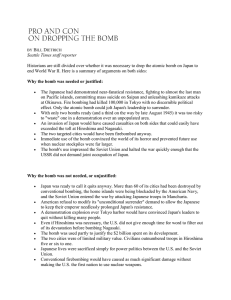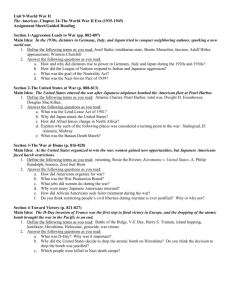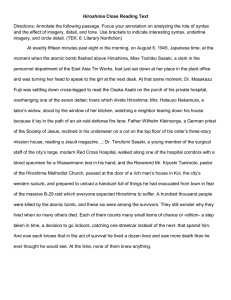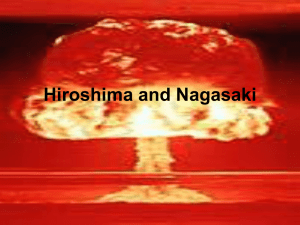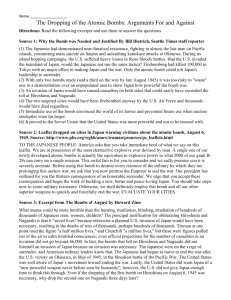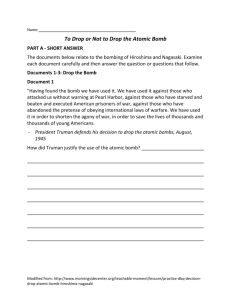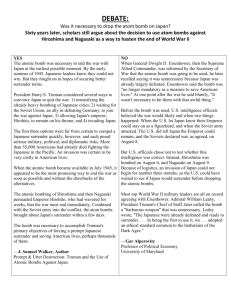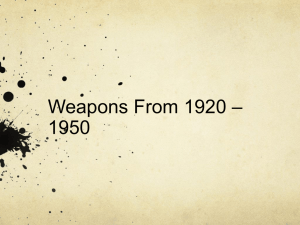BY BILL DIETRICH Seattle Times staff reporter Introduction During
advertisement
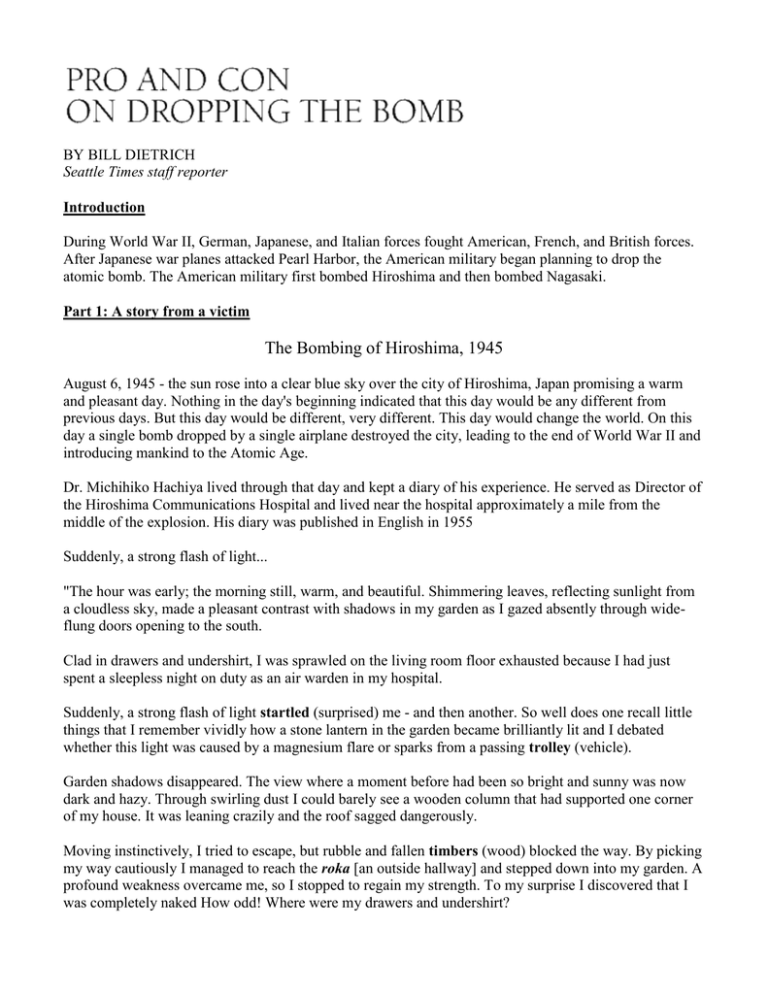
BY BILL DIETRICH Seattle Times staff reporter Introduction During World War II, German, Japanese, and Italian forces fought American, French, and British forces. After Japanese war planes attacked Pearl Harbor, the American military began planning to drop the atomic bomb. The American military first bombed Hiroshima and then bombed Nagasaki. Part 1: A story from a victim The Bombing of Hiroshima, 1945 August 6, 1945 - the sun rose into a clear blue sky over the city of Hiroshima, Japan promising a warm and pleasant day. Nothing in the day's beginning indicated that this day would be any different from previous days. But this day would be different, very different. This day would change the world. On this day a single bomb dropped by a single airplane destroyed the city, leading to the end of World War II and introducing mankind to the Atomic Age. Dr. Michihiko Hachiya lived through that day and kept a diary of his experience. He served as Director of the Hiroshima Communications Hospital and lived near the hospital approximately a mile from the middle of the explosion. His diary was published in English in 1955 Suddenly, a strong flash of light... "The hour was early; the morning still, warm, and beautiful. Shimmering leaves, reflecting sunlight from a cloudless sky, made a pleasant contrast with shadows in my garden as I gazed absently through wideflung doors opening to the south. Clad in drawers and undershirt, I was sprawled on the living room floor exhausted because I had just spent a sleepless night on duty as an air warden in my hospital. Suddenly, a strong flash of light startled (surprised) me - and then another. So well does one recall little things that I remember vividly how a stone lantern in the garden became brilliantly lit and I debated whether this light was caused by a magnesium flare or sparks from a passing trolley (vehicle). Garden shadows disappeared. The view where a moment before had been so bright and sunny was now dark and hazy. Through swirling dust I could barely see a wooden column that had supported one corner of my house. It was leaning crazily and the roof sagged dangerously. Moving instinctively, I tried to escape, but rubble and fallen timbers (wood) blocked the way. By picking my way cautiously I managed to reach the roka [an outside hallway] and stepped down into my garden. A profound weakness overcame me, so I stopped to regain my strength. To my surprise I discovered that I was completely naked How odd! Where were my drawers and undershirt? What had happened? All over the right side of my body I was cut and bleeding. A large splinter was protruding from a mangled (ugly) wound in my thigh, and something warm trickled into my mouth. My check was torn, I discovered as I felt it gingerly, with the lower lip laid wide open. Embedded in my neck was a sizable fragment of glass which I matter-of-factly dislodged (removed), and I studied it and my blood-stained hand. Where was my wife? Suddenly thoroughly alarmed, I began to yell for her: 'Yaeko-san! Yaeko-san! Where are you?' Blood began to spurt. Had my carotid artery (artery in the neck) been cut? Would I bleed to death? Frightened and irrational, I called out again 'It's a five-hundred-ton bomb! Yaeko-san, where are you? A fivehundred-ton bomb has fallen!' Yaeko-san, pale and frightened, her clothes torn and blood stained, emerged from the ruins of our house holding her elbow. Seeing her, I was reassured. My own panic assuaged (went away), I tried to reassure her. 'We'll be all right,' I exclaimed. 'Only let's get out of here as fast as we can.' She nodded, and I motioned for her to follow me." It was all a nightmare... Dr. Hachiya and his wife make there way to the street. As the homes around them collapse, they realize they must move on, and begin their journey to the hospital a few hundred yards away. After the Blast "We started out, but after twenty or thirty steps I had to stop. My breath became short, my heart pounded, and my legs gave way under me. An overpowering thirst seized me and I begged Yaeko-san to find me some water. But there was no water to be found. After a little my strength somewhat returned and we were able to go on. I was still naked, and although I did not feel the least bit of shame, I was disturbed to realize that modesty had deserted (left) me. On rounding a corner we came upon a soldier standing in the street. He had a towel draped across his shoulder, and I asked if he would give it to me to cover my nakedness. The soldier surrendered the towel quite willingly but said not a word. A little later I lost the towel, and Yaekosan took off her apron and tied it around me. Our progress towards the hospital was very slow, until finally, my legs, stiff from drying blood, refused to carry me farther. The strength, even the will, to go on deserted me, so I told my wife, who was almost as badly hurt as I, to go on alone. This she objected (refused) to, but there was no choice. She had to go ahead and try to find someone to come back for me. Yaeko-san looked into my face for a moment, and then, without saying a word, turned away and began running towards the hospital. Once, she looked back and waved and in a moment she was swallowed up in the gloom. It was quite dark now, and with my wife gone, a feeling of dreadful loneliness overcame me. I must have gone out of my head lying there in the road because the next thing I recall (remember) was discovering that the clot on my thigh had been dislodged (removed) and blood was again spurting from the wound. I pressed my hand to the bleeding area and after a while the bleeding stopped and I felt better Could I go on? I tried. It was all a nightmare - my wounds, the darkness, the road ahead. My movements were ever so slow; only my mind was running at top speed. In time I came to an open space where the houses had been removed to make a fire lane. Through the dim light I could make out ahead of me the hazy outlines of the Communications Bureau's big concrete building, and beyond it the hospital. My spirits rose because I knew that now someone would find me; and if I should die, at least my body would be found. I paused to rest. Gradually things around me came into focus. There were the shadowy forms of people, some of whom looked like walking ghosts. Others moved as though in pain, like scarecrows, their arms held out from their bodies with forearms and hands dangling. These people puzzled me until I suddenly realized that they had been burned and were holding their arms out to prevent the painful friction (rubbing) of raw tissue rubbing together. A naked woman carrying a naked baby came into view. I averted (look away) my gaze. Perhaps they had been in the bath. But then I saw a naked man, and it occurred to me that, like myself, some strange thing had deprived (removed) them of their clothes. An old woman lay near me with an expression of suffering on her face; but she made no sound. Indeed, one thing was common to everyone I saw - complete silence. Part 2: Was the bombing necessary? Historians are still divided over whether it was necessary to drop the atomic bomb on Japan to end World War II. Here is a summary of arguments on both sides: Why the bomb was needed or justified: The Japanese had demonstrated a strong resistance that they would not give up easily. The Japanese fought in their battles until every soldier was dead and refused to surrender. In other battles, they would commit mass suicide like in Saipan and unleashing kamikaze attacks (air attacks in which the pilot was designed to lose his life) at Okinawa. Only the atomic bomb could force Japan's leadership to surrender. With only two bombs ready (and a third on the way by late August 1945) it was too risky to "waste" one in a demonstration over an unpopulated area. An invasion of Japan would have caused casualties and deaths on both sides that could easily have exceeded the toll (caused more deaths) at Hiroshima and Nagasaki. The two targeted cities would have been firebombed anyway even if the atomic bomb was not used. Immediate use of the bomb convinced the world of its horror and prevented future use when nuclear stockpiles (weapons) were far larger. The bomb's use impressed the Soviet Union (Russia) and encouraged them to join America’s side. Why the bomb was not needed, or unjustified: Japan was ready to call it quits anyway. More than 60 of its cities had been destroyed by conventional (regular) bombing, the home islands were being blockaded (important goods were being blocked) by the American Navy, and the Soviet Union entered the war by attacking Japanese troops in Manchuria. The American government could have helped stop the war earlier if it would have allowed Japan to surrender and keep its emperor. Instead, the American government said that it would not allow the Japanese emperor to stay if Japan surrendered. This caused the Japanese to stay in the war longer. A demonstration explosion over Tokyo (biggest city in Japan) harbor would have convinced Japan's leaders to quit without killing many people. Even if Hiroshima was necessary, the U.S. did not give enough time for word to get out of its devastation before bombing Nagasaki. The bomb was used partly to justify the $2 billion spent on its development. Otherwise, American citizens would have been upset that there tax money was wasted. The two cities were of limited military value. Civilians (non-military) outnumbered military troops in Hiroshima five or six to one. In other words, there were many more civilians than soldiers in Hiroshima. Japanese lives were sacrificed just to convince the Soviet Union to enter the war. Normal firebombing would have caused as much significant damage without making the U.S. the first nation to use nuclear weapons. Part Three: What do you think? My Claim: Text evidence to support claim: Link (connection between evidence and claim): Possible counter-argument: (what would someone who disagrees with you say?) My response to a counter-argument: My Claim: Text evidence to support claim: Link (connection between evidence and claim): Possible counter-argument: (what would someone who disagrees with you say?) My response to a counter-argument: Do you think it was right for the United States military to drop the atomic bomb on Hiroshima and Nagasaki? Why or why not? (Write one page on your opinion)
